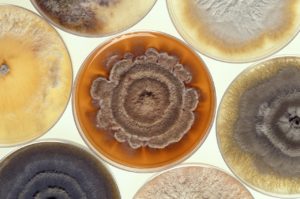Mold exposure and inability to detoxify mold and mycotoxins from your body is detrimental to your health, especially the health of your brain. In fact, chronic brain fog is a big sign that some kind of biotoxin like mold is crossing your blood brain barrier and causing inflammation and other havoc. Other BIG mold symptoms include anxiety, panic, and night sweats. Yes, your anxiety and depression may be linked to mold exposure. And your night sweats may not be early menopause; they could be a result of exposure to mold! When I was in my early thirties, I started to suddenly have night sweats. I was so perplexed. I thought “I am way too young to be going through menopause!” Thankfully, one of my instructors at my nutrition school suggested it may be mold in my bedroom. Sure enough, there was mold in the corner wall close to my pillow (this wall never got any sun) and as soon as it was remediated, my night sweats went away!
Is everyone sensitive to mold? No. But now that we have more advanced testing to detect mold in our environments and in our bodies, a lot more people are mold sensitive than previously thought!
If you have any of the symptoms listed above, and cannot visibly see mold in your environment, do a quick history timeline and see if a move or change in work environment corresponded to the onset of your symptoms. Has there ever been water damage in the building where you reside or work? The answer is often yes…people forget! If you are not sure or have lived in a place for a long time and symptoms have gradually worsened, you can always do a home test to start that is not very expensive. The ERMI test is popular and although not 100% accurate, it can at least give you an idea. Qualified mold inspectors are quite expensive, but worth the investment if you suspect mold and your health is deteriorating – affecting your mood, relationships, work, and overall joy in life. Ten questions to find a qualified mold inspector.
There are many tests that can indicate mold or other biotoxin illness. For example, a couple of tests that you can request from your primary care physician include ADH (Antidiuretic Hormone) and osmolality. ADH and osmolality are usually low when there is mold or other biotoxin exposure. If osmolality is low, replenishing with electrolytes can be very helpful.
New testing now allows us to measure mycotoxins in our bodies. Mycotoxins are molecules produced by mold and mycotoxin elevations can come from our foods or our environments. Certain mycotoxins are carcinogenic, while others may affect our endocrine, immune or neurological systems. In any case, there is a lot we can do to support lowering the body burden of mycotoxins.
Mold is tricky. Supporting immune health, the gut and the liver, and detox pathways are all critical to getting rid of mold and decreasing mycotoxin load. Often, we see overgrowth of pathogenic gut bugs, parasites, and even heavy metals along with mold. Mold really weakens us and makes us more susceptible to everything else.
Of course, there are solutions and you can heal from mold illness and get your brain back! The first step is to get rid of the mold exposure, whether from food or your environment. Specific foods can help decrease the adverse effects of certain mycotoxins. Certain nutritional supplements are very helpful in binding up mold toxins and also supporting overall detoxification and immune system health.
Antioxidants are often used to mitigate the oxidative effects of these mold toxins like Vitamins A, E, C, and also N Acetyl Cysteine and liposomal glutathione. Bentonite Clay and Zeolite Clay are reported to reduce absorption of multiple mycotoxins found in food.
Movement and sweating are critical in detoxification of just about everything! Support your drainage system by dry skin brushing or jumping on a mini rebounder! If you are not a good sweater, this can be a sign of toxicity! If you cannot induce a sweat through exercise, then use a sauna regularly (under the guidance of your physician!)
Mold is one of the many contributing factors to brain decline. When you address mold, you are often also covering other biotoxins that may be contributing to brain decline. It can seem a bit overwhelming to know where to start. That is why I offer my three month Revitalize Your Brain program. We look at all the possible contributing factors and prioritize where to start!
Please set up your complimentary strategy session with me today to determine if this program is right for you!

